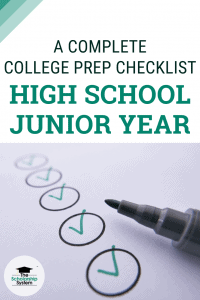Updated on July 12th, 2024
Wow, can you believe it?! Your student’s junior year already marks the halfway point of their high school journey and is a pivotal time. Colleges and universities look closely at their grades, scheduled courses, and activities when making admissions decisions. For both students and parents, it is imperative to stay on top of the whole college admission preparation process both during high school junior year and the following summer.
While there is not any one way to approach the tasks needed to prepare for college, we believe there are certain tasks on college list that, when completed, will put your student on a path for success. Planning and preparation are essential components to accomplishing you and your child’s goals. Let us help you make that ride as smooth as possible! Here is our complete college prep list for high school juniors!
Is your student in high school but not a junior? Click your student’s year for a checklist for them too!
Should be completed prior to high school junior year:
- Meet your guidance counselor
- Get involved in extracurricular activities
- Consider a college savings plan and add to an existing one if you have already have one started
- Getting involved: Continue to build your credentials- Keep track of your extracurricular awards, community service achievements, and anything else you participate in
- Create your resume
- Begin getting ready for the ACT
- Stay on track with your courses: Talk with your guidance counselor to make sure you’re enrolled in the classes you need to prepare you for college or a career
- Explore your career options in more detail: “Job shadow” someone who does what you think you’d like to do
- Volunteer in your community
- Start your college search
Fall:
- Start studying for the SAT/ACT, SAT Subject Tests and AP exams as soon as the school year begins
- Take the PSAT
- Stay on track with your classes and grades
- Have your child study for the ACT/SAT
- Make a list of potential colleges you would like to attend
- Make sure your resume is up-to-date and continue updating it throughout the year
- Create a document of any awards and involvements to use in the future
- Evaluate education options: vocational-technical school, career college, or two-year or four-year college, military college
- Discuss careers and which majors can lead there
- Gather college information: Attend college fairs, college nights and speak to representatives from colleges that attend your high school
- Begin planning campus visits
- Mark the dates on a calendar for upcoming tests: SAT, ACT, and AP exams
- Continue involvement in extracurricular and volunteer activities and seek leadership roles
- Continue building relationships with your teachers as 11th grade teachers are the ones that you will most likely ask for letters of recommendation
- Read as much as possible: Expand your outside reading list
- If a course member, begin watching videos, implementing action items as you go
- Apply for scholarships as many allow juniors to apply
Winter:
- Stay involved with extracurricular activities
- Study for the ACT/SAT
- Getting involved: Holidays and winter break are great times to volunteer
- Organize your college information
- Start narrowing down your college choices: if you haven’t already start planning some college visits
- Note merit scholarship requirements for these colleges
- Continue discussing careers and corresponding majors
- Shadow career fields
- Prepare for standardized tests: research the test requirements of the colleges you wish to attend (SAT, ACT, or SAT Subject Tests) and register for the tests
- Learn more about financial aid
- Apply for scholarships: find scholarships with little competition but can fund a free ride
- Start planning for a productive summer: Check on internship deadlines
- If a course member, winter break is a great time to implement a large portion of the materials
Spring:
- Getting involved: Some schools allow new members to join after winter break
- Prepare your class schedule for senior year: stick with a schedule that challenges you versus all easy classes/meet with your school counselor to discuss your options
- Consider ways to earn college credit via Advanced Placement, International Baccalaureate, CLEP, or Dual Enrollment courses
- Continue your scholarship search and apply: find scholarships with little competition BUT will fund a free ride
- Contact your letter of recommendation writers: employer, coach, activity leader, or adult who knows you well outside of school
- Check for local scholarships in the guidance office before school year ends
- Apply for a summer internship or job
- Set up appointments at your top college choices including a personal interview, tour of the campus and meet with a professor/coach
Summer:
- Visit Colleges: Visit the top 5 campuses on your list
- Work a summer job to gain experience, build a resume, and save money for college
- Maximize summer to build competitiveness
- Talk to others about their experience in college especially if the student is attending a college on your list
- Organize your financial aid information
- Start working on your college application essays: Have a teacher read and discuss the essays with you
- Continue to pursue scholarship opportunities and apply! *Junior year summer is ideal for mastering the scholarship process, slowly working through the 6-step process Doing so over the summer means you can have materials ready to reuse for senior year!
- Letters of Recommendation: Request these letters with at least a 2-week notice
- Develop a strong personal statement for scholarships
- Retake the SAT/ACT to improve score
- Finalize personal statement based on junior year
- Write down all deadlines for FAFSA, admissions applications and scholarships (including state-based and merit-based scholarships)
It’s easy to get caught up in all the various college applications and prep but don’t forget to cheer your student throughout the process. They have worked so incredibly hard to get here and deserve TONS of praise for their efforts and hard work!
FAQs
What grade should I start preparing for college?
Starting to prepare for college before the beginning of your junior year is crucial for several reasons. While this article focuses on a college prep timeline for juniors, beginning earlier allows ample time for comprehensive planning and execution.
By the end of sophomore year, students should ideally have identified their academic strengths and weaknesses, explored potential career interests, and started researching colleges. This early start enables them to tailor their junior year courses to align with college admissions requirements and personal goals, such as challenging coursework or specialized extracurricular activities.
Plus, early preparation allows students to build a strong foundation for the college application process. They can start drafting personal statements, gathering letters of recommendation, and even exploring scholarship opportunities.
Beginning before junior year also alleviates the stress associated with last-minute preparations and ensures that students have sufficient time to refine their applications, seek advice from counselors or mentors, and make informed decisions about their future academic and career paths. Overall, starting early sets a proactive tone, enhancing the chances of a successful college admissions journey.
How to start preparing for college in 11th grade?
If your student is trying to figure out how to prep for college as a junior, following a structured approach outlined by resources like the College Board junior checklist and our list above is essential. Start by focusing on things to do junior year of high school, including taking challenging courses that align with your academic strengths and interests. This year is crucial for maintaining a strong GPA and preparing for standardized tests like the SAT or ACT.
Also, research colleges that match your academic and personal preferences, exploring factors such as location, size, majors offered, and campus culture. Attend college fairs, virtual tours, and information sessions to gather firsthand insights.
Another vital step is to research financial aid opportunities early on. Understand the types of aid available, such as scholarships, grants, and loans, and explore eligibility criteria and application deadlines. Stay organized throughout this process and use an outlined college timeline for juniors to track application deadlines, test dates, and required documents. By starting early and methodically following these steps, students can confidently navigate the college preparation process and maximize their chances of admission to their preferred institutions.
Can a junior in high school complete the FAFSA?
While it’s wise to plan ahead and research federal student aid during junior year, completing the FAFSA in their junior year is typically unnecessary. The FAFSA is primarily designed for students who are applying for financial aid for the upcoming academic year, which begins after high school graduation for most students.
However, there are exceptions where juniors might need to consider completing the FAFSA earlier. For instance, if a student plans to attend a summer session at a college after completing their senior year of high school, they may need to submit the FAFSA early to meet financial aid deadlines for that summer session. Similarly, students who are graduating from high school early and enrolling in college before their peers may also need to complete the FAFSA earlier than traditional seniors.
In most cases, juniors can wait until their senior year to complete the FAFSA when they have a clearer picture of their college plans and financial aid needs. It’s essential to stay informed about specific college financial aid deadlines and requirements, as these can vary by institution. Students and their families should consult with their school counselors or financial aid offices to determine the appropriate timing for submitting the FAFSA based on their individual circumstances and college plans.
Download a copy of the checklist by clicking the button below:
If you and your child would like to learn more about how to get started with scholarships, sign up for our free college scholarship webinar! It’s a great way to learn about the process and how to identify opportunities that can help your student avoid debt while pursuing their education!
And if you want our latest list of scholarships with deadlines coming up, go to www.thescholarshipsystem.com/scholarshiplist.









Great post! I’m a high school junior and this checklist is super helpful in keeping me on track for college applications and scholarships. I especially appreciate the breakdown of scholarship deadlines and the tips for researching and applying to scholarships. It’s easy to feel overwhelmed by the process, but this post has given me a clear roadmap to follow. Thanks for sharing!